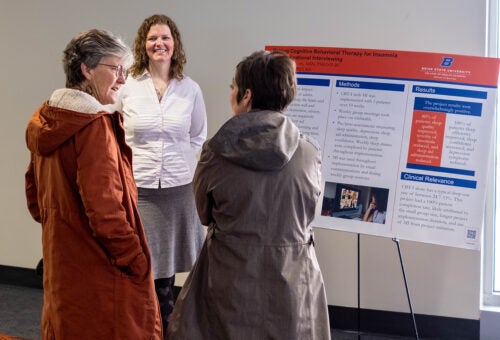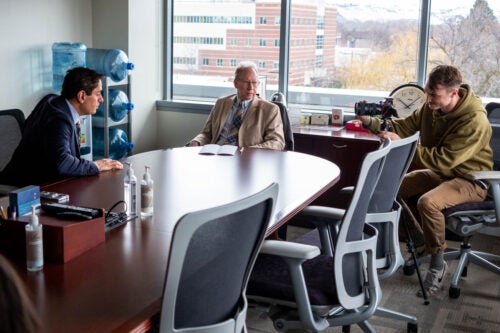The online Doctor of Nursing Practice program at Boise State includes several in-person sessions, including annual leadership immersions. These are on-campus learning experiences that provide cohorts meaningful time to share ideas and grow together professionally.
This year’s leadership immersion was distinctly different as it was the first year the graduating class presented their capstone research (known as scholarly inquiry projects) in a poster format. Previous cohorts gave individual presentations utilizing slides; this year was more akin to sessions one might participate in at a research conference.
“We strive to provide opportunities that build skills in presenting information that reaches various audiences,” said Teresa Serratt, director of the Doctor of Nursing Practice in Leadership program. “The poster session simulates this experience as their interactions are often spontaneous and with people with a myriad of backgrounds and levels of knowledge of their subject matter.”
Seven students presented on topics ranging from addressing the opioid crisis through patient education to understanding moral distress in nurse leaders.
Snapshot of two scholarly inquiry projects

Kassandra Ransom is a member of the graduating cohort and a psychiatric mental health nurse practitioner. Her scholarly project investigated cognitive behavioral therapy – using methods other than medicines – to increase insomnia patients’ quality of sleep.
For her, the most rewarding part was discovering tools and tactics she could take with her into her daily work.
“With the support of my faculty, I was able to imagine, create, develop, research and implement my project into the finished outcome that will help my patients long into my career,” Ransom said.
Lauren Kalember’s inquiry project addressed the overflow of pediatric mental health patients into medical units. Many non-psychiatric nurses are caring for these patients without additional training after nursing school, and many are anxious about it. So Kalember designed her project to equip nurses through simulation training.
“My hope was that by empowering nurses, patients and their families would have a better experience and outcomes while awaiting psychiatric care,” Kalember said.
Her results are encouraging: she saw a 25% increase in nurse confidence after the training. Kalember now hopes to be able to implement similar training opportunities across the children’s hospital where she works.
“I’d like to dig more into the confidence and the clinical outcomes, based on this,” she said. “It’s been a fun project.”
New sessions emphasize leadership and professional development

Other new parts of the leadership immersion event included presentations from faculty and guest speakers. The goal was for students to develop relevant professional skills they could take into future roles of nursing leadership.
Sessions for students in their second year of the program focused on skills for project management, such as collecting and managing data, engaging stakeholders and troubleshooting when problems arise.
Students in their final year of the program received training on cyber security, marketing themselves and interacting with members of the media.
The result of previous students’ feedback, this new session allowed students to practice interviewing in several scenarios. Media outlets often contact nurse leaders for their expertise, but the typical nursing education doesn’t include media relations training.
“Our media training is designed to provide an opportunity to learn basic skills for these interactions and practice them,” Serratt said. “It is an essential skill for nurse leaders today.”